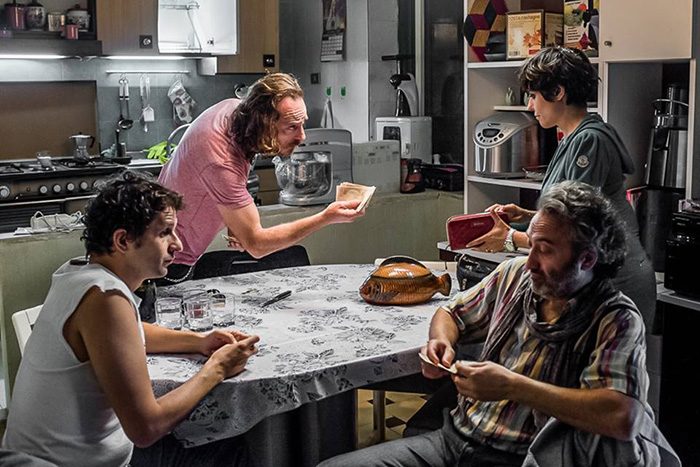It starts off so magically with conjoined twins Dasy (Angela Fontana) and Viola (Marianna Fontana) bringing hope and the word of God to the unfortunate souls languishing in poverty just north of Naples, Italy. They’re blissful when singing, eating up the attention and love from their parents Peppe (Massimiliano Rossi) and Titti (Antonia Truppo) despite our knowing that love is steeped in exploitation. This is the life these girls know. They have no computers or cellphones, their cut of the money goes to a bank account they should be able to use soon after turning eighteen. Removed from their naiveté and innocence is a carny lifestyle they’ve embraced to find purpose within a city that adores them. So what happens when they realize there’s more to be had?
This is the central question of Edoardo De Angelis‘ Indivisible. Co-written with Barbara Petronio and Nicola Guaglianone (the story’s originator), the answer proves as complex as you’d hope a scenario as wildly unique as this would provide. It’s difficult not to wonder why the sisters haven’t been separated yet after peering over them for the first time. I’m not a doctor, but the way they move alludes to the fact they don’t share the same hip bone and therefore could be sawed in half, stitched up, and given a new lease on life. Being shut off from anything outside what their parents show them, they’ll never come to the same conclusion. As soon as an unsolicited doctor introduces the possibility, however, nothing will ever be the same.

We’re meeting Dasy and Viola at a seminal moment of adolescence wherein a desire to fly the coop is unavoidable. Our initial glimpse is of them in bed—the latter asleep, the former pleasuring herself (and, due to common capillaries, her sister too) beneath the covers. Dasy is discovering her sexuality, something spending every waking second of her life with her sibling has thus far stunted. She’s also starting to feel frustrated at the ill effects of Viola’s eating giving her the bellyache instead. So despite singing at random paying events many times before, serendipitously running into famed music producer Marco Ferreri (Gaetano Bruno) stirs something inside. Dasy enjoys the attention he gives her and the promises he makes. She yearns for more than her father can supply.
The doctor’s announcement of this medical miracle is therefore the impetus to put her foot down whether Viola agrees with the show of force or not. Dasy begins wielding her leverage as the breadwinner in the family (bolstered by Toni Laudadio‘s hairstylist Nunzio and Marco Mario de Notaris‘ missionary Nando). The dynamic between them all starts to shift as those two men question their consciences after riding the girls’ coattails for so long and Tittie accepts her lack of power to stop anyone from doing anything. Peppe will not quit, though. He doubles down on his attitude and problematic morals, compromising his love for flesh and blood to satiate a desire for fortune. The magical dream of success in a quirky world unravels to reveal the greed underneath.

De Angelis effectively utilizes the juxtaposition of these angelic singers against their seedy town readying to corrupt. It begins with a wonderful long take of what look to be prostitutes exiting a boat on the water, the shore littered with flames. The camera follows them to a nearby neighborhood, swooping higher into the bedroom window of Dasy and Viola. We assume both glimpses exist separately until morning comes and Titti and Peppe are met. These two are uncouth at best, cigarettes or joints lit in mouth and impatience etched on face. Suddenly the girls transform into flowers amongst a garden of weeds, their sunny disposition a beacon of hope their priest (Gianfranco Gallo‘s Don Salvatore) uses to procure his flock. Who wouldn’t jump at the chance for escape?
Everyone’s shown with warts at the forefront from young children seeking opportunities to feel where the sisters are attached to the despicable few weighing potential rewards to be reaped over the twins’ health. The sort Ferreri hangs around with will need to be experienced on your own, this menagerie of sexpots, drug-addicts, and performance artists a truly modern Barnum and Baily enterprise soaked in booze. A few bright lights cut through the sideshow like a local gentleman hiring the girls to sing for his fiancé, but they are a rarity and obviously unequipped to alleviate anyone’s plight. Dasy and Viola ultimately have only themselves to rely on, one’s strength offsetting the other’s misery to keep them both afloat. Sadly their arms can’t avoid growing heavier by the minute.

The nightmare grows exponentially worse as each promise for salvation arrives with a crippling defeat. Dasy is ready to do whatever it takes while Viola refuses to compromise who they are. The latter won’t become like those who have sought to abuse their generosity and youth, the former struggles to retain optimism that they won’t have to when giving in could grant them freedom much faster. They’re so pure at heart that you have to believe a happy ending will come on the horizon, but such a hope begins to wane with each subsequent stumble forward. The climax proves devastating as a result: its embodiment of the sinister acts performed for selfish gain in the name of God an unforgettable depiction of futility and surrender. Only despair remains.
Bruno is a delight of suave smarm, the epitome of finding success in a broken world. Truppo provides a nice foil of hidden regret opposite Rossi’s delusions of grandeur and inflated self-worth. One knows she’ll never possess the love necessary to rebuild a relationship with her daughters the right way and the other is still unable to realize he’s been lying to himself about his motivations from the start. They help create this hyper-real atmosphere surrounding Dasy and Viola, pushing them to the brink of emotional stability and sanity. And the Fontana sisters amazingly traverse this evolving landscape, alternating between warrior and crippled as the plot wears them down to nothing. We desperately crave they’ll earn a victory, but a release from the torture may have to suffice.
Indivisible played at the Toronto International Film Festival.

